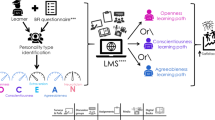Abstract
THE PURPOSE OF THIS STUDY was to examine the relationship of personality-based learning styles and learning among graduate students enrolled in an online doctoral program that utilized the BlackboardSM e-leaming system. Two measures of learning—course grades and perceived learning—were used. According to the Myers-Briggs Type Indicator®, the majority of students in the sample (N = 64) were extraverts, intuitives, feelers and judgers. This profile differed from that of the general population on two personality dimensions: sensing-intuition and judging-perceiving. The general population tends to be sensors rather than intuitives and to be equally distributed between judgers and perceivers. No significant differences in learning were found based on learning styles. The implication for practice is that an online course can achieve equity in learning for all personality-based learning styles provided the course is designed to include elements that appeal to students with different styles. However, what is not known are the roles of motivation to learn and volition for students to persist despite any incongruence between individual learning style and the course as presented.
Similar content being viewed by others
References
Aragon, S.R., Johnson, S.D., & Shaik, N. (2000).The influence of learning style preferences on student success in online vs. face-to-face environments. Paper presented at the Academy of Human Resource Development Conference, Raleigh-Durham, North Carolina. (ERIC Document Reproduction Service No. ED441128)
Atman, K. (1988). Psychological type elements and goal accomplishment style: Implications for distance education.The American Journal of Distance Education, 2(3), 36–44.
Brenner, J. (1997).An analysis of students’ cognitive styles in asynchronous distance education courses at a community college. (ERIC Document Reproduction Service No. ED415924)
Corrallo, S. (1994). The progress of a study identifying the speaking and communication skills of college graduates. In S. Morreale & M. Brooks (Eds.),1994 NCA summer conference proceedings and prepared remarks: Assessing college student competency in speech communication (pp. 51–54). Annandale, VA: National Communication Association.
Cronbach, L.J., & Snow, R.E. (1977).Aptitudes and instructional methods. New York: John Wiley.
Gee, D.G. (1990).The impact of students’ preferred learning style variables in a distance education course: A case study. Portales, NM: Eastern New Mexico University. (ERIC Document Reproduction Service No. ED358836)
Gordon, H.R.D. (1995).Description of the productivity and learning style preferences of on- and off-campus distance education participants at Marshall University. (ERIC Document Reproduction Service No. ED390308)
Herbster, D.L., Price, E., & Johnson, V.R. (1996).Comparing university students and community college students learning styles and Myers-Briggs Type Indicator (MBTI) preferences. (ERIC Document Reproduction Service No. ED395907)
Hiltz, S.R., & Wellman, B. (1997). Asynchronous learning networks as a virtual classroom.Communications of the ACM, 40(9), 44–49.
Hsu, T.E., Frederick, F.J., & Chung, M. (1994).Effects of learner cognitive styles and metacognitive tools on information acquisition paths and learning hyperspace environments. Paper presented at the Convention of the Association for Educational Communications and Technology, Nashville, TN. (ERIC Document Reproduction Service No. ED373721)
James, W.B., & Gardner, D.L. (1995). Learning styles: Implications for distance learning,New Directions for Adult and Continuing Education, 67, 19–32.
Keirsey, D. (1998).Please understand me II. Del Mar, CA: Prometheus Nemesis.
Kolb, D.A. (1984).Experiential learning. Englewood Cliffs, NJ: Prentice-Hall.
McCaulley, M.H., Macdaid, G.P., & Kainz, R.I. (1985). Estimated frequencies of the MBTI types,Journal of Psychological Type, 9, 3–9.
McCaulley, M.H., & Natter, F.L. (1996).Psychological type differences in education. Gainesville, FL: Center for Applications of Psychological Type, Inc.
McCroskey, J. C., Sallinen, A., Fayer, J.M., Richmond, V.P., & Barraclough, R.A. (1996). Nonverbal immediacy and cognitive learning: A cross-cultural investigation.Communication Education, 45(3), 200–211.
Myers, I.B. (1990).Introduction to type: A description of the theory and application of the Myers-Briggs Type Indicator. Palo Alto, CA: Consulting Psychologists Press.
Myers, I.B. (1998).Introduction to type: A guide to understanding your results on the Myers-Briggs Type Indicator® (6th ed.). Palo Alto, CA: Consulting Psychologists Press.
Myers, I.B., & McCaulley, M.H. (1985).MBTI manual: A guide to the development and use of the Myers-Briggs Type Indicator. Palo Alto, CA: Consulting Psychologists Press.
Myers, I.B., McCaulley, M.H., Quenk, N.L., & Hammer, A.L. (1998).MBTI manual: A guide to the development and use of the Myers-Briggs Type Indicator (3rd ed.). Palo Alto, CA: Consulting Psychologists Press.
Rasmussen, K.L., & Davidson-Shivers, G.V. (1998). Hypermedia and learning styles: Can performance be influenced?Journal of Educational Multimedia and Hypermedia, 7(4), 291–308.
Shindler, J.V. (1998).Who gets into teaching?Cognitive style as a variable in predicting teaching as a career choice. (ERIC Document Reproduction Service No. ED423219)
Witkin, H.A., & Goodenough, D.R. (1981).Cognitive styles: Essence and origins. New York: International Universities Press, Inc.
Author information
Authors and Affiliations
Rights and permissions
About this article
Cite this article
Rovai, A.P., Grooms, L.D. The relationship of personality-based learning style preferences and learning among online graduate students. J. Comput. High. Educ. 16, 30–47 (2004). https://doi.org/10.1007/BF02960281
Issue Date:
DOI: https://doi.org/10.1007/BF02960281




